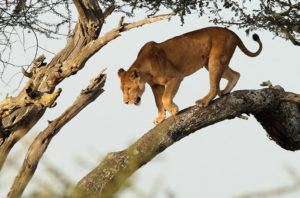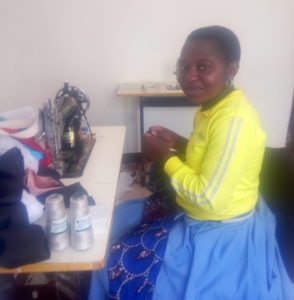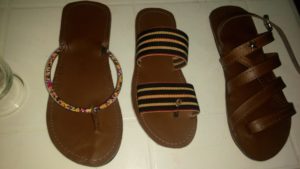By Giza Mdoe
Fall 2018 InGear/InStitch
[In October 2018, P4P shipped a container with 469 bikes and 119 sewing machines to our new partner in Tanzania, the Matabaiki Olere Organization. Giza Mdoe is our contact there. Here he introduces himself, his region, and his plans for two projects: one with sewing machines and one with bikes.]

The Matabaiki Olere Organization is based in the town of Arusha, Tanzania. Arusha is a tourist hub, 60 miles from Kilimanjaro, the highest mountain in Africa, and 100 miles from the Serengeti Plains and the Ngorongoro Crater, the world’s largest caldera, home to the world’s only tree-climbing lions. The Ngorongoro Conservation Area also contains the Olduvai Gorge, one of the most important paleoanthropological sites in the world.
I grew up in Kenya, where I was raised by a foster family. They live in Boston now.
Sewing-machine Project: Fabrics of Society (FOST)
Fabrics of Society (FOST) is a project for training single mothers in sewing, tailoring, design, and marketing.

The sewing machines will all go into a production line for various items to be sold in country and exported, including to the U.S. At the moment I enroll school drop-outs who are single mothers. We have five sewing machines and the women make sandals as well as clothes. In this country when a girl gets pregnant in school she is expelled and is not allowed back into school even after her child is born, worsening the cycle of poverty.
The girls learn to use the machines free of charge. They take a percentage of the sales. We donate books and supplies to local schools where our girls give testimonials to help with awareness.
Depending on availability of sewing machines and trainers, FOST aims to enroll 180 women in the training program and 20 tailors (who have previous experience). We will hire 2 teachers and 3 training assistants.
The trainees will attend 3-hour classes 3 times a week. The training is done in 4 stages, each lasting 3 months with each stage marking a specific level of proficiency. A small enrolment fee is charged to give the members a sense of responsibility and ownership.
The initiative is done in partnership with VETA, the Tanzanian Vocational Education and Training Authority, who will issue certificates of achievements to the graduates. The project will start in Dar es Salaam and then move to other regions.
Besides technical training in tailoring, the initiative provides basic life skills in health, nutrition and sanitation. Focus is family planning as well as the importance of pre- and post-natal clinics, breastfeeding, balanced diets and personal hygiene.
Bicycle Project: Watu wa Delivery (WWD)
Watu wa Delivery (WWD) is Swahili for “delivery people”. It is designed to create employment for impoverished youth in urban areas. Employees will use bicycles to deliver food to urban residential areas and mail to commercial centers.
I expect to put at least 200 bikes into the delivery business project and sell the rest to raise the U.S. $6000 for our next shipment. Since I have never done such a project before I don’t know how long it will take but am assuming a couple of months.
The program will begin in Mbeya, which has a large population of urban unemployed youth.
The initiative will hire a delivery crew of 1500 and a dispatch and maintenance crew of 500. We will establish 50 Dispatch Centres. Each Dispatch Centre will have 10 bikes and each bike will be assigned between 2 and 3 delivery persons to work half- and full-day shifts according to their availability.
WWD will also establish telecom, internet, and networking services. Examples of these services are low-cost mobile calls and texts, marketing for sellers, a mobile app and a WWD website for buying, selling, and customer rating of sellers.
Besides job-specific activities, WWD will conduct monthly outreach programs for youth providing education on sexual health, drug abuse, youth rights, hygiene, health and nutrition, environment, vocational training and accelerated learning options.

